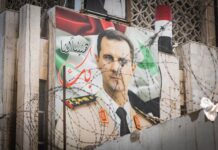The Sri Lankan authorities have blamed “local Islamist groups” possibly linked to foreign organisations for the Easter attacks which killed over 350 people. But many question marks persist over the perpetrators and motives behind the attacks.
If the official version is correct, why did Muslims target Christians in a country where tensions between those two groups do not exist?
If the attacks were in response to the Christchurch massacre, as the authorities say, how could such sophisticated, coordinated attacks be prepared in such a short space of time?
And what about Sri Lanka’s extremist Buddhist monks who want to see a backlash against the Muslim community?
What have the Sri Lankan authorities said?
Sri Lanka’s government has blamed the blasts on local “Islamist group” National Thowheed Jamath (NTJ) but Prime Minister Ranil Wickremesinghe said the attacks “could not have been done just locally.”
The Defence Minister also told parliament that NTJ was linked to another radical Islamist group he named as JMI. He gave no further details.
Subscribe to our newsletter and stay updated on the latest news and updates from around the Muslim world!

He also said “preliminary investigations” indicated that the bombings were in retaliation for deadly attacks on mosques in Christchurch, New Zealand, in March.
NTJ has no history of large-scale attacks but came to prominence last year when it was blamed for damaging Buddhist statues. The group has not said it carried out Sunday’s bombings.
The Sri Lankan government is facing scrutiny after it emerged the authorities were warned about a possible attack. Security services had been monitoring the NTJ but the prime minister and the cabinet were not warned, ministers said.
There is no history of tension between Muslims and Christians in Sri Lanka so many have asked why Christians would be targeted when it is Buddhist extremists who’ve been targeting Muslims in Sri Lanka?
Neither has there been any so-called “Islamist violence” in the Asian nation. And a sophisticated, coordinated bombing operation would take months to prepare. Whereas the Christchurch bombing happened only one month ago.
ISIS claim of responsibility
On Tuesday, ISIS claimed responsibility for Sunday’s blasts, breaking two days of silence on the matter.

A communique identified seven attackers and which locations each of them struck across churches, hotels, and housing in Sri Lanka’s Batticaloa, Colombo, Dematagoda, and Negombo areas. The ISIS news agency, Amaq, released a video minutes afterwards of the attackers pledging allegiance to ISIS leader Abu Bakr al-Baghdadi together, led by suspected attack “mastermind” Moulvi Zahran Hashim.
ISIS didn’t mention the attack on Christchurch mosques in New Zealand as a motivator behind the Sri Lanka attacks, but Tuesday’s communiqué touts victims in Sri Lanka as “Christian combatants.”
It added that the attacks were made against “churches and hotels in which citizens of the Crusader coalition were present.”
While many analysts are taking the ISIS claim of responsibility seriously, others have noted that the group has often claimed responsibility for attacks it hasn’t performed or which it is only tenuously linked to.
Buddhist violence?
There is, however, a history of Buddhist extremist violence against Muslims in Sri Lanka. And many of these Buddhist groups have close ties with the Sri Lankan authorities, which has led to speculation that the attacks were designed to provoke a backlash against Muslims and provoke a religious war.
There is, as yet, no hard evidence to support this theory.
Clashes between Buddhist extremists and Muslims occurred in two different towns in Sri Lanka, Kandy and Ampara, in early 2018. Triggered in part by hate-filled posts spread by nationalistic Sinhala Buddhist Facebook groups, these riots resulted in the death of one Muslim and the destruction of many buildings.

The Buddhist Protestantism of the 19th century, the monks who invoked Buddhist texts to justify the Sri Lankan civil war, and the extremist movements surging today all have one thing in common: a belief that Sri Lanka is a Buddhist nation that must be protected from foreign elements, violently if necessary.
After they won independence from Britain in 1948, Sri Lanka’s politicians started to enforce the use of the Sinhala language across the country’s public institutions, making it the official language. They also inserted Buddhism into the constitution.
When the civil war ended in 2009, many hoped that Sri Lanka’s ethnic groups would find a way to coexist in peace. But it didn’t take long before the country’s Buddhist extremists found another target.
Currently, Sri Lanka’s most active Buddhist extremist group is Bodu Bala Sena (Buddhist power force, or BBS). BBS entered politics in 2012 with a Buddhist-nationalist ideology and agenda, its leaders claiming that Sri Lankans had become immoral and turned away from Buddhism. And whom does it blame – Sri Lankan Muslims.
BBS’s rhetoric takes its cue from other populist anti-Muslim movements around the globe, claiming that Muslims are “taking over” the country thanks to a high birth rate. It also accuses Muslim organisations of funding international terrorism with money from Halal-certified food industries. These aren’t just empty words; in 2014, one of their anti-Muslim protest rallies in the southern town of Aluthgama ended with the death of four Muslims.
BBS also has links to Myanmar’s extremist 969 movement. Led by nationalist monk Ashin Wirathu, who calls himself the “Burmese bin Laden”, it is notorious for its hardline rhetoric against the Rohingya Muslim community.
State of confusion
There is currently a social media blackout in Sri Lanka so it is hard to gauge what the nation is thinking, but all the Sri Lankans 5Pillars spoke to said that, like the rest of us, they are struggling to understand the motives behind the Easter attacks.
They added that they expected some kind of backlash against the Muslim community.












![The Taliban’s Road To Success [Short Film]](https://5pillarsuk.com/wp-content/uploads/2024/11/Kabul-roadworks-thumbnail-218x150.png)









